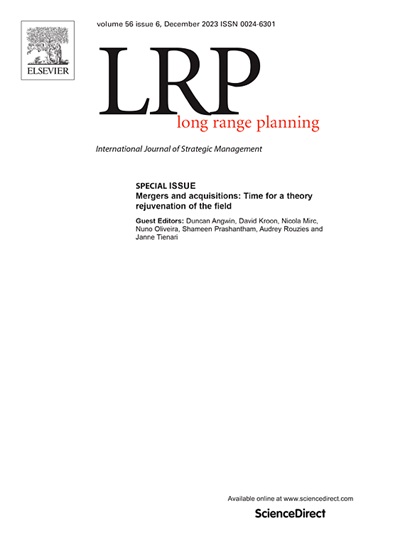实践目的说教!企业目标对员工多付出努力意愿影响的实验证据
IF 6.3
2区 管理学
Q1 BUSINESS
引用次数: 0
摘要
商业组织越来越多地(重新)根据企业目标来定义他们存在的理由,超越利润最大化,通过为社会和地球的福利做出贡献来创造价值。在此背景下,本文采用两阶段的自然现场实验来探讨企业目标是否、何时以及如何影响员工完成额外工作的意愿。研究的主要发现表明,接受有关企业目标的信息会导致员工完成更多的额外工作。个人偏好与组织目标相匹配的员工反应最积极。然而,如果一个组织没有真正地实践它的目的,就会产生适得其反的效果。此外,研究结果表明,潜在的机制主要是由员工对工作意义的感知变化驱动的。在更广泛的背景下,研究结果——员工愿意为一个有目标的组织工作时付出额外的努力——为理论上提出的目标商业案例提供了一些实证证据。本文章由计算机程序翻译,如有差异,请以英文原文为准。
Practice the purpose preach! Experimental evidence on the effect of corporate purpose on workers' willingness to go the extra mile
Commercial organizations increasingly (re)define their reason for being in terms of a corporate purpose that reaches beyond profit maximization to create value by contributing to the welfare of society and planet. In that context, this paper employs a two-phase natural field experiment to explore whether, when and how a corporate purpose affects workers' willingness to complete extra work. The main findings show that receiving information about an organization's corporate purpose causes workers to complete more extra work. Workers whose personal preferences match with the organization's purpose are most responsive. However, in case an organization does not authentically practice its purpose preach a backfiring effect can occur. Furthermore, the findings show that the underlying mechanism is driven primarily by a change in workers perceived meaning of work. In a broader context, the findings – that workers are willing to go the extra mile when working for an organization with purpose – provide some empirical indications in support of the theoretically proposed business case of purpose.
求助全文
通过发布文献求助,成功后即可免费获取论文全文。
去求助
来源期刊

Long Range Planning
Multiple-
CiteScore
13.00
自引率
7.10%
发文量
75
期刊介绍:
Long Range Planning (LRP) is an internationally renowned journal specializing in the field of strategic management. Since its establishment in 1968, the journal has consistently published original research, garnering a strong reputation among academics. LRP actively encourages the submission of articles that involve empirical research and theoretical perspectives, including studies that provide critical assessments and analysis of the current state of knowledge in crucial strategic areas. The primary user base of LRP primarily comprises individuals from academic backgrounds, with the journal playing a dual role within this community. Firstly, it serves as a platform for the dissemination of research findings among academic researchers. Secondly, it serves as a channel for the transmission of ideas that can be effectively utilized in educational settings. The articles published in LRP cater to a diverse audience, including practicing managers and students in professional programs. While some articles may focus on practical applications, others may primarily target academic researchers. LRP adopts an inclusive approach to empirical research, accepting studies that draw on various methodologies such as primary survey data, archival data, case studies, and recognized approaches to data collection.
 求助内容:
求助内容: 应助结果提醒方式:
应助结果提醒方式:


